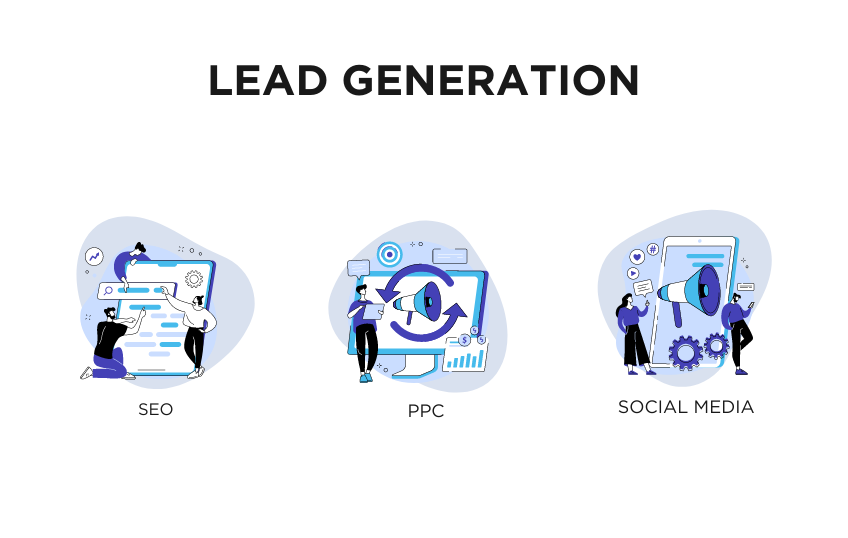How To Get Leads To Your Website With 3 Top Strategies
If you run an online business, getting leads to your website is one of the most important things you need to do. In a marketing context, a “lead” refers to making contact with a potential client or customer. Examples of leads include contact forms, emails, phone calls, etc. Getting leads to your website can be challenging, however.

Now, if you keep asking how to get leads to your website… well, this post will outline a variety of strategies that can be used for lead generation. There are many ways to generate leads, but we are going to focus on three great and effective ways to do it: SEO, PPC and social media.

1. SEO
Enhancing your website’s search engine optimization (SEO) is one of the best ways to get leads to your website. SEO is the process of optimizing a website to increase its ranking on search engine results pages. Having an effective SEO campaign is also a great way to generate leads to your website.
Not sure how strong your site’s SEO is? Grading your website with our tool is free and takes less than a minute! Check your SEO now.
How to get leads to your website with SEO?
There are many ways that SEO can be used for lead generation. Here are just a few:
- Keyword Research: Researching what people are searching for is great for lead generation. After completing keyword research, you can use these relevant keywords in your marketing efforts to attract potential customers to your website.
- Long-tail Keywords: During your keyword research, be sure to target long-tail keywords. Long-tail keywords are phrases that are typically 4-6 words long, and there is less competition between websites for these keywords.
- Write Interesting Meta Descriptions and Titles: Meta descriptions and titles summarize the content of a page. Meta descriptions and titles are great for gaining leads because they inform users about what to expect on a certain page. Wondering how to write a great headline? Check out this article!
- Optimize Landing Pages: When performing SEO on your site’s landing pages, add “calls-to-action” links that, when clicked, count as a lead. Need some landing page design inspiration? Check out this article!
- Optimize Website For Mobile Users: Many websites fail to properly optimize their content for mobile users. This can hurt their lead generation efforts. When optimizing your website for mobile visitors, be sure that calls-to-action links are still visible.
Want to know more about SEO? Read how to do SEO?
2. PPC
Pay-per-click advertising (PPC) is perhaps the best way to generate leads to your website. PPC is a digital marketing model where advertisers pay each time an internet user clicks on one of their ads.
The most common type of PPC ads are “paid-search ads,” and they appear when people search for a particular keyword or phrase that matches with an ad. It is important to note that ads must be bid on during the Ad Auction to be successfully displayed. The Ad Auction will then rank advertisers based on a combination of their bid and Quality Score.
PPC campaigns can be managed through Google Ads for ads run on Google and Microsoft Advertising for ads run on Bing.
How to get leads to your website with PPC advertising?
Listed below are some PPC strategies that can be utilized to get leads to your website.
- Target The Right Audience: At the campaign level of PPC, you can choose what group you would like to target. You can target age demographics, the time-of-day ads are shown, geographic location, and more. These targeting options will allow you to only run ads for people that might be interested in your website, which is great for lead generation.
- Create Unique Landing Pages: When running paid ads, it is important to create landing pages that deliver what the ad promised. If a user clicks an ad, but it takes them to an irrelevant landing page, that person is unlikely to be a lead for future business.
- Use Negative Keywords: Adding negative keywords to an ad campaign is great to get leads to your website. Setting negative keywords will prevent your ads from running if an undesirable keyword is searched. You can choose negative keywords that you know will not result in any lead generation.
- Track Your Campaign: You can track your ad campaigns using Google Ads and Microsoft Advertising. These services will detail valuable metrics regarding your campaigns such as click-through-rate, impressions, bounce rate, and more.
- Use Ad Extensions: Ad extensions provide additional functionality or information to ads. You can add extensions like calls and messaging that directly lead to leads.
- Write Compelling Ad Copy: The more interesting your ad is, the more likely a user is going to click on it and become a lead.
Utilizing social media platforms is another great way to increase leads to your website. In 2020, there were 3.96 billion people active on social media in the world. Based on the volume of people on social media alone, it is critical that you promote your website on these platforms.
Lead generation on social media platforms
Facebook is currently the most popular social media platform, and it is a great place to generate leads. Here are some tips for attracting leads on Facebook:
- Include offers in ads
- Monitor comments
- Make calls-to-action obvious
- Take advantage of Facebook Lead Ads
- Choose ad targeting options
Instagram is another popular social media platform where leads can be generated. Below are some great ways to get leads to your website from this platform:
- Engage with your audience
- Use tools like Instagram Live and Stories
- Add calls-to-action in posts
- Reach out to influencers for potential partnerships
- Use Instagram Lead Ads
- Create Facebook lookalike audiences
- Share user-generated content
X
X (formerly known as Twitter) is one of the three most popular social media platforms and a great place to gain leads for your website. Here are some strategies to get leads from X.
- Create an X Ads account
- Choose the right format for your ads
- Create videos
- Add calls-to-action that generate leads
- Pin a tweet that is relevant to your target audience
- Segment your audience by using Lists
- Monitor conversations
Now that you know how to get leads to your website, you’re ready to optimize your lead gen efforts. If you need an extra hand implementing these tactics, we’ve got you covered! Contact us today to hear how our lead generation experts can help grow your business!
Google Maps SEO: 10 Tips to Rank Higher on Google Maps
What is Google Maps SEO? Google Maps SEO (search engine optimization) is the process of making your business visible on Google Maps when users search for related keywords to your business. As an internet user, you have likely done a Google search to find a local store selling the product you’re looking for near you. […]
Read moreHow To Check Google Ranking?
Learning how to check Google ranking lets you know how much exposure your website receives for specific keywords. Checking your website’s Google ranking may help you identify areas of strengths and weaknesses you can improve on to rank higher on the SERPs and boost your return on investment (ROI). Read on for more information about […]
Read moreWhat Is Google EEAT and How To Optimize Your Site?
Over the years, digital marketers have determined the key elements that produce a high-ranking webpage. But little is known about the Google algorithm that puts webpages at the top of the SERP. However, Google has provided helpful guidelines to ensure quality pages match user intent. Explore what Google EEAT is and what you can do […]
Read moreHow To Add Google Analytics to WordPress?
Google Analytics is one of the most efficient web analytics tools offered by Google for businesses and individuals who want statistics on a specific website’s performance. Further to this, it provides you as the site owner with data on visitor insights such as how they access the site, the channels they use, top keywords used to […]
Read more
